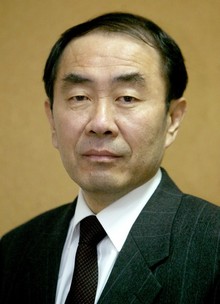 |
|
Jang Jung-soo, English Editor
|
Jang Jung-soo, English Editor
If we take the results of the May 31 local elections and apply them to the next presidential election, one thing is certain: it is only a matter of time for the Grand National Party (GNP) to win the presidential race. The various polls, conducted after the May elections, support this view, all indicating that the GNP alone enjoys an almost 50-percent popularity among voters.
Nonetheless, no one is at a vantage point to tell with certainty who will be the nation’s next president. Although the last elections clearly showed the winners and losers as divided by party lines, the presidential election is surrounded by a fog of uncertainty.
The conflicts and divisions seen in both the ruling Uri and the main opposition Grand National parties may be an indication that perhaps there will be a major political reshuffle prior to the presidential election. This is likely, because all the major presidential hopefuls’ support ratings converge around 20 percent, which is well below the commonly-perceived 35 percent ’threshold’ to becoming a serious presidential contender.
For the GNP, the Achilles’ heel is the rivalry between the party’s leader Park Geun-hye and the incumbent Seoul mayor Lee Myung-bak. Both of the party’s presidential front-runners are from the same southeastern province, both are popular among conservatives, and both have similar ratings in the polls.
Yet if the GNP holds the national party convention before the end of June next year to select its presidential nominee, as required by election law, and if the process is carried out in accordance to the current party rules, then Park, whose support has soared since the May 31 elections, will be more likely nominated.
On the other hand, if Park’s rival, Lee Myong-bak, sees a low chance of being selected as the party’s presidential candidate, he may opt out of participating in the party’s national convention and decide to run as an independent candidate. This is because the revised election law prohibits those who fail to become a party’s presidential nominee to subsequently run as an independent candidate.
If Lee decides to go it alone, it will create great uncertainty surrounding the election. If such a scenario materializes, especially if the ruling Uri Party carries out its desired political reshuffle, and worse, if Son Hak-kyu, Governor of Gyeonggi province, also joins the presidential race, then the whole presidential race will turn into a more uncertain drama. On the other hand, if Park and Lee reach a dramatic agreement to put forward one or the other as a single candidate, then the GNP will be able to take the upper hand in the presidential race.
After all, support for the GNP isn’t as high as to automatically guarantee its victory in the next presidential election. Its 53.8 percent support in the last May 31 elections was a mere 1.7 percent increase from the 52.1 percent just prior to the 2002 elections, which it lost.
So, the presidential election, taken together, will boil down to a neck-and-neck competition between the GNP’s 51 percent and the Uri’s 49 percent in voter support. This is why the next presidential election, as often seen in previous ones, will unfold unpredictably. For example, the GNP swept the 2002 local elections, including major ’hot spots’ such as Seoul mayor, Gyeonggi governor and Incheon mayor. Yet it lost to the Uri in the presidential election held six months later.
In general and local elections, voters are able to show their satisfaction or dissatisfaction with the government’s performance. In that sense, the May 31 elections can be seen as a ’mid-term evaluation’ for the job the Roh administration has done so far.
The upcoming presidential election, however, differs. In presidential elections, people cast their votes based on future visions and the ability of a candidate to carry out his pledges. It is a confidence vote for the future, rather than a performance vote for the past.
So, for a political party, whether it will win the presidential race or not depends on whether it has someone of presidential material who can win the election. In this regard, the Uri party is in crisis. It doesn’t have a presidential hopeful who will be a serious presidential contender. Its support base has also collapsed and the party’s own survival is in a serious doubt, much less to think about its winning the presidential election.
The Uri has to choose. It can either recruit an outside individual who is presidential material and reshuffle the party around him in order to win the presidential race, or it can dissolve the party altogether and create a new one by merging with other parties.
Regardless of what it chooses to do, it will end up facing the key dilemma: how to define its relationship with President Roh. It is very likely that the Uri party’s potential presidential candidates may choose to distance themselves from President Roh and even confront him in a bid to renew their image and have a better chance to win the election. If that happens, their may be a head-on collision between the Uri Party and the president.
So, the Uri Party needs to tackle this issue wisely and realign the party around its presidential nominee well. This is critical if it wants to revive and rise again, and ultimately win the next presidential race.





